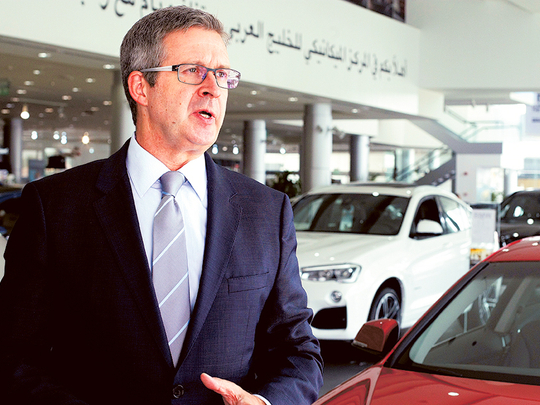
Dubai: For the region’s wealthy — and quite finicky, which comes with the territory — car buyers, a soft retail market is definitely not going to get in the way of their decisions.
And the BMW Group is reaping the full benefits of such sentiments.
For the first time, the carmaker’s line-up of pricey ‘sports activity models’ — under the X model range — has crossed the 50 per cent mark in overall BMW sales during the first three months of the year. It now stands at the 55 per cent mark, with the X5 — priced upwards of Dh285,000 — being the top-selling BMW model across all categories. The X range sales was at the mid-40 per cent mark in the last year volumes. With the recent launches of the power-packed X6 M and X5 M, the grip on volumes will get stronger.
“BMW sales had grown at 11 per cent through the first quarter, compared with 7 per cent that the overall premium car market managed during the same period,” said Johannes Seibert, regional Managing Director. “The stronger economies of the Gulf have been compensating for the loss of sales from Syria, Iraq and Yemen. The UAE, Saudi Arabia and Kuwait now represent three-quarter’s of the BMW regional volumes.
“But, where we can, full support is being extended to our Iraqi importer to continue selling in Erbil, where sales average 12-15 units a month.
“We have stayed the course whenever our importers faced problems stemming from larger issues ... our partner in Lebanon is the oldest long-standing BMW importer, and have been with us since 1955. And much happened in Lebanon over the decades — but this alliance held fast.”
n the first quarter, Lebanon accounted for 255 units, up by 100 from a year before.
But these remain uncertain times for the region’s automotive sector. Be it conflicts in some markets or an erosion in confidence brought on by low oil prices, showrooms are not seeing as many movements as they have been used to in the last four years. New model launches these days typically bring in the initial rush of committed buyers but then stabilise — or take a dip — thereafter.
In the case of European auto brands and their importers, another reason for unease relates to euro’s recent decline against the dollar. But, according to Seibert, there will be no move to cut showroom prices and get someone to buy. “For years now, it has been the firm decision by us — and our importers — to do nothing that will spoil the residual value of the brand. That means retaining a pricing stability irrespective of currency movements.
“When the euro had gone up to 1.4 to the dollar, we did not increase model prices despite the pressure on importers.
“But now, with the soft euro (currently 1.1 to the dollar), we have given enough leeway to importers to provide incentives to buyers as they see fit. Where they can, they have come up with some interesting offers.”
Seibert says that worries about the economy is reflected more on retail sales. “Fleet is a priority and not just in an opportunistic way to get higher sales numbers,” Seibert said. “The presence of more 7 and 5 series models on the streets shows up as a major marketing impact for the brand name.
“The oil price situation has led to adjustments on the part of consumers, but that’s to be expected.”
But with the X range in its arsenal, and more variants on the way, Seibert needn’t get unduly perturbed.












